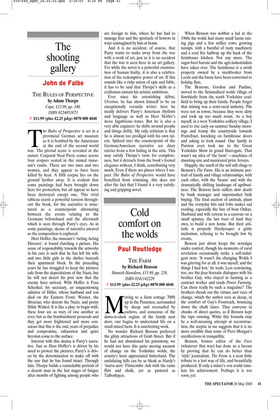Cold comfort on the wolds
Paul Routledge
THE FARM by Richard Benson Hamish Hamilton, £15.99, pp. 229, ISBN 0241142229 ✆ £13.99 (plus £2.25 p&p) 0870 800 4848 Moving to a farm cottage 700ft up in the Pennines, surrounded by sheep and serenaded by curlews, and conscious of the dawn-to-dusk regime of the family next door, one begins to understand life on a small mixed farm. It is unrelenting work.
No wonder Richard Benson preferred the glitzy attractions of Grub Street. But if he had not abandoned his patrimony, we would not have this quite moving memoir of change on the Yorkshire wolds, the county’s least appreciated hinterland. The undulating hills can be as bleak as Hardy’s ‘starve-acre’ Flintcombe Ash with the same flint and chalk, yet as pastoral as Talbothayes. When Benson was nobbut a lad in the 1960s the wolds had many small farms raising pigs and a few milker cows, growing turnips, with a barnful of rusty machinery and a coal fire halfway up the back of the farmhouse kitchen. Not any more. The sugar-beet barons and the agri-industrialists have taken over. The farmhouse is a swish property owned by a stockbroker from Leeds and the barns have been converted to holiday flats.
The Bensons, Gordon and Pauline, moved to the fictionalised wolds village of Sowthistle from the south Yorkshire coalfield to bring up their family. People forget that mining was a semi-rural industry. Pits were not in towns, because they were dirty and took up too much room. As a boy myself, in a west Yorkshire colliery village, I used to rise early on summer Sunday mornings and tramp the countryside towards Pontefract, knocking on farmhouse doors and asking to look round. One family in Purston even took me to the Great Yorkshire Show in grand Harrogate. That wasn’t my idea of ‘the farm’ —machines of daunting size and manicured prize Jerseys.
Happily, the smell of the soil still clings to Benson’s The Farm. His is an intimate portrait of family and village relationships, with each other, with the ‘beasts’ and with the dramatically shifting landscape of agribusiness. The Benson farm suffers slow death by bank manager and supermarket bulk buying. The final auction of animals, plant and the everyday bits and bobs makes sad reading, especially the fate of boar Onkus. Husband and wife retreat to a caravan on a small spinney, the last tract of land they own, to build a new home. But their attitude is properly Hardyesque: a gritty meliorism, refusing to be brought low by events.
Benson just about keeps the nostalgia under control, though his moments of rural revelation occasionally strike a self-indulgent note. ‘It wasn’t the changing Wolds I was grieving for at all: it was myself, and the things I had lost,’ he wails. Less convincing, too, are the faux-Socratic dialogues with his brother Guy, who stayed in farming as a contract worker and reads Power Farming. Can there really be such a magazine? The brothers thrash out the virtues and vices of change, which the author sees as decay, in the comfort of Guy’s Fourtrack, bouncing down the chalk lanes. They converse in chunks of direct quotes, as if Benson kept the tape running. While this formula may be a well-meaning attempt at reconstruction, the sceptic in me suggests that it is no more credible than some of Piers Morgan’s recollections in tranquillity.
Benson, former editor of the Face (whatever that was) has done us a favour by proving that he can do better than ‘style’ journalism. The Farm is a neat little tribute to a lost way of life, and beautifully produced. If only a miner’s son could emulate his achievement. Perhaps it is too soon, yet.






















































 Previous page
Previous page